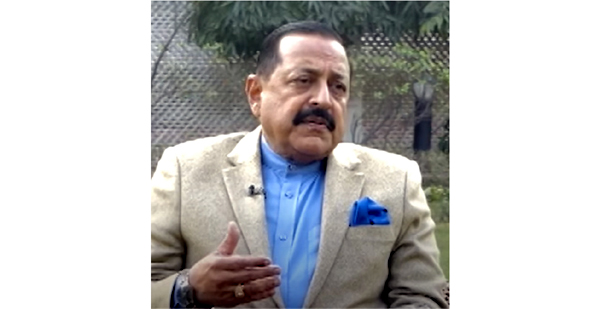
Excelsior Correspondent
NEW DELHI, Jan 29 : The hallmark of Modi governance model is that it is citizen-centric, not voter-centric. The distinguishing features of this model are courage of conviction to move beyond status quo, capacity to break the taboos of the past and firm decisiveness preceded by due diligence and research.
This was stated by Union Minister Dr Jitendra Singh while responding to a Sunday Cover Story interview by a national media channel . He said, Prime Minister Modi spends long many hours developing innovative ideas and personally follows up the major projects with a keenness to stick to the timeline.
Denying the observation by the interviewer that some critics accused Prime Minister Narendra Modi of being autocratic and arrogant like Indira Gandhi, Dr Jitendra Singh said the truth is quite the contrary because Modi has tremendous patience to listen to each one of his team members and gather their inputs for which he may spend hours together. He is always open to suggestions and opinions from all quarters and never takes a decision without getting into the bottom of the subject.
If Indira Gandhi was set to be an autocratic PM, said Dr Jitendra Singh, we have instances of that era when the then Rashtrapati, Fakhruddin Ali Ahmed was woken up in the middle of night to sign the orders declaring ‘Emergency’ and everything was done in haste without any discussion. This certainly is not a part of Modi’s style of functioning, he said.
Modi has the capacity to walk the talk, said Dr Jitendra Singh, which is borne out by decisions like abrogation of Article 370 and construction of Ram Janmabhoomi temple.
Dr Jitendra Singh said, PM Modi has the capacity to go beyond status quo after doing due diligence and due study, capacity to take and execute decisions within a fixed timeline. He said, Modi is a consistent thinker, who gets into micro-research of every subject. He said, the hallmark of Modi’s style is that he has courage and conviction to take path breaking decisions, courage and conviction to break the taboos of the past and those are reflected in governance reforms like doing away with the rule requiring attestation of documents by a gazetted officer, abolition of 1,600 odd obsolete laws or unlocking of the Space sector for private participation and cabinet approval of Geospatial Guidelines.
Dr Jitendra Singh said, Modi provided a Governance Model first in Gujarat as Chief Minister and then as Prime Minister, which is a sustainable Model of Governance and also a model which defies the principle of diminishing returns and which became stronger with every challenge like the earthquake when he was CM and pandemic when he is PM.
In reply to a question, Dr Jitendra Singh said, the undertone of all the welfare schemes of Prime Minister Narendra Modi for the last over 8 and half years is that he is trying to change the political culture, where citizen-centric or people-centric measures rather than voter-centric decisions were being taken, which all political parties have to emulate. The Minister said, Modi is trying to reach out to the last man in the last queue in the true spirit of Antyodaya without any consideration of caste, creed, religion or vote bank consideration. He also added that grrassroot participation of the citizens is being realized in Jammu & Kashmir only after Modi came to power in May, 2014.
On the question of Bharat Jodo Yatra, Dr Jitendra Singh said, this government does not follow the practice of stopping Yatras as was being done by successive Congress governments. He recalled that in 1953, Syama Prasad Mukherji was illegally detained, when he was trying to enter Jammu and Kashmir and after a brief detention he died in a mysterious circumstance.Again in 1992, Modi was the key organizer of the BJP’s Ekta Yatra under leadership of Dr Mulrli Manohar Joshi, when they unfurled the Indian flag Tricolour at Srinagar’s Lal Chowk. The Minister recalled that in 2011, top BJP leaders Sushma Swaraj, Arun Jaitley and Ananth Kumar were arrested on entry into Jammu and Kashmir.

